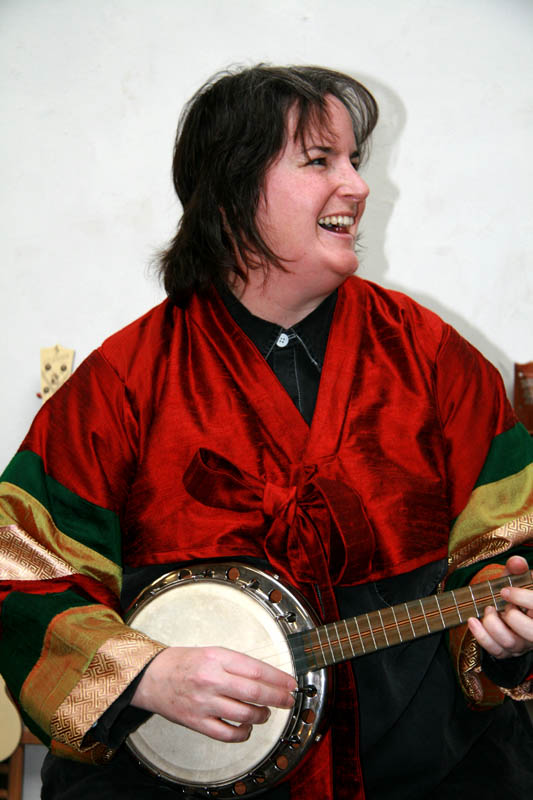Alumna’s album revamps cartoon tunes

Musician and UCLA alumna Megan Lynch performs in Berkeley in March. She released her first album last fall.
By Alex Goodman
March 31, 2010 9:25 p.m.
The tune “Hello Ma Baby” was written around the turn of the 20th century, but it was immortalized in 1955 by a frog ““ Michigan J. Frog, actually, the vaudevillian Warner Bros. character, who sang it with a top hat and a cane in a cartoon called “One Froggy Evening.” That scene was parodied in turn by an alien after it erupts from John Hurt’s chest in the Mel Brooks comedy “Spaceballs.” Species purists may prefer a new version, sung by Megan Lynch, a human being ““ and a UCLA alumna.
“Hello Ma Baby” is the opening track on Lynch’s album, her first, called “Songs the Brothers Warner Taught Me.” As the title suggests, these are all melodies one could find in a classic Warner Bros. cartoon, treated here in a style derived from jazz standards and American roots music. Browse the albums at the top of the Billboard charts, and you will find none like it, and few with such thematic cohesion.
“Most people don’t know those songs in their entirety, and they were just regular songs when they were written,” Lynch said. “So I thought that would be a nice hook; that would be a nice thematic thing to work an album around. And I thought that for some people who don’t know me from a hot rock, they might be interested in buying the album simply because they’re fans of that era or fans of Warner Bros. cartoons.”
Lynch graduated from UCLA, in the gown-and-mortarboard sense, in 1988, though she admits she had to take one final class afterward that may have taken her until the following year. She majored in art, concentrating on drawing and painting, and moved to San Francisco to attend the California College of Arts and Crafts (known these days as the California College of the Arts), intending to become an illustrator.
She dropped out of art school after a semester to do something with a guaranteed paycheck, but she didn’t drop music; she could play the guitar and the ukulele, and had sung her entire life, often harmonizing with her mother. Lynch entered the San Francisco music scene as best she could, performing at open mic nights and teaming up at times with two other female singer-songwriters, but stardom proved elusive.
“At that point in my life, I was not that assertive, and I also had this naive idea that if I was good enough, things would come to me, which is just so wrong,” Lynch said. “It doesn’t matter how good you are, you really do have to be assertive about what you do.”
But Lynch ended up doing less and less, her ability to play instruments dwindling because of bilateral thoracic outlet syndrome, a neurogenic disorder that mainly affects the nerves passing from the neck to the arms. She drifted through various jobs until she decided in 2007 to finally record an album. She reached out first to her friend Mike DaSilva, owner of DaSilva Ukulele Co. and a recording engineer who had approached Lynch a year earlier about working together. DaSilva became the sound engineer for “Songs the Brothers Warner Taught Me,” and most of the recording was done in his studio.
“We tried to keep (the album) really open, really airy, with lots of space, so you can hear all of the different instruments clearly but have the vocals still stand out,” DaSilva said. “I think it’s probably different than a lot of commercial recordings these days, where they try to make everything really super loud. We paid more attention to how balanced it was, so you could hear everything that was going on. There are a lot of subtle, musical things going on with the string players as well as Megan’s vocals.”
She then enlisted Tony Marcus, a musician she’d played with numerous times over the years. Marcus and Robert Armstrong, who both played with the legendary comic book artist R. Crumb in His Cheap Suit Serenaders, played most of the music on the album.
“The interesting thing to me, in terms of what’s often called the golden age of American songwriting, which would be from the ’20s through World War II … is that when younger people are actually given a chance to listen to interesting renditions of those songs, they get it,” Marcus said. “They can appreciate it as such. If you think about it just as a novelty thing, some people are going to say, why bother? But the material itself, it seems to me, is strong enough that people who have ears and listen to it are often intrigued.”
It’s still early ““ the album was first released digitally on Bandcamp.com in October and has only made it onto platforms such as iTunes and Amazon in the last few weeks ““ but Lynch has been encouraged by the experience. Hers is the kind of story music students love to hear, about the true attainability of creative goals.
“I could have done this 20 years ago, and I wish I had,” Lynch said. “I think a lot of it is just having the guts and the belief that it’s going to work out.”


